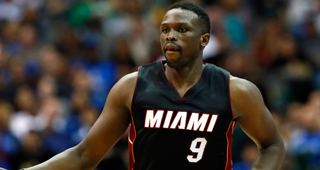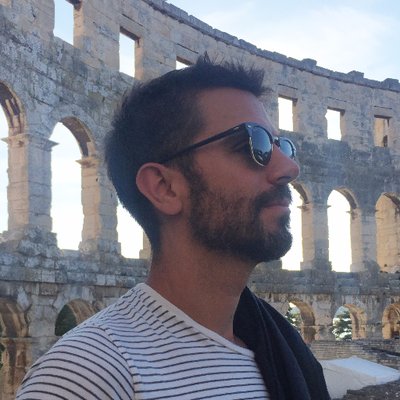The move to power forward following Chris Bosh’s season-ending blood clots resurrected the free agent value of Luol Deng, who signed with the Los Angeles Lakers on a four-year, $72 million deal. Deng should probably be used exclusively as a power forward at this stage of his career as he had a 12.5 PER before the break and 18.4 afterwards when Bosh was out and almost all of his minutes came at the 4. The Lakers preferred Kent Bazemore over Deng for this signing on the wing and while Bazemore is four years younger with under 5,000 career minutes compared to nearly 30,000 for Deng, the latter is the better fit as a combo forward. Bazemore is capable of playing small forward but he’s not strong enough defensively in a lot of matches and is better guarding 1’s and 2’s.
With a probable starting lineup of D’Angelo Russell, Jordan Clarkson, Julius Randle and Timofey Mozgov to go with Deng, he’ll start at the 3 but will slide up to the 4 when he plays with Brandon Ingram. The Lakers’ version of the Death Lineup, maybe called the Menace Lineup, of Russell, Clarkson, Ingram, Deng and Randle could be feisty at times and certainly will be entertaining. Randle has shown little promise has a shooter but that’s at least five guys who can put the ball on the floor after a rebound and can also make plays off the bounce.
Deng will serve as the model of development for Ingram, who of course also went to Duke and will start his career at the 3 before eventually moving to more of a small ball 4 as Deng has over the past few years. The Lakers clearly needed an adult in the locker room last season since Kobe Bryant is a lot of things but he’s not particularly engaged in that area and Deng will fill that role. His influence over Russell, Clarkson, Randle and Ingram has the potential of being immeasurable. Deng also won't block the development of either Randle or Ingram since they'll likely divide up nearly all of the available 96 minutes at the two forward spots while they can also play together with Randle at center.
Miami was 4.3 points per 100 possessions better with Deng on the floor in the second half of the season with the big difference being on the offensive end.
Deng scored a very good 1.33 points per possession on nearly two transition attempts per game. Luke Walton figures to play an uptempo style seeking out easy early offense buckets and Deng will fit in nicely with the rest of their core.
Deng’s versatility on defense and his length makes him incredibly valuable still on defense even though he’s not the shut-down guy he was earlier in in his career. As a full time power forward, Deng has more value on defense since he’s unlikely to be a liability against most 4’s.
With the young core of the Lakers developing at an encouraging yet somewhat sluggish rate, the lure of two max slots hasn’t been what their front office had been hoping to become. Signing both Deng and Mozgov plus re-signing Clarkson likely takes the Lakers out of the running for two max slots next summer for an even better free agency class that would have had more information about their core. I found this path to be the right one but you can only go empty handed to so many free agent meetings, or be stuck outside talking to Kevin Durant’s doorman so many times before reconsidering the approach.
The opportunity cost of these moves for a pair of older free agents that will be asked to get the Lakers from Point A to Point B but won’t be around for Point C when they’re contending in any meaningful way is clear with the loss of that space. But the Lakers have been stuck in a doomed purgatory putting vague approximations of an NBA lineup on the floor and losing a ton of games. The Lakers have rebuilt in the past at a light-speed pace full of shortcuts and since that’s clearly not happening this time around, they’ve instead now shifted to signing players that are effectively human gauze to stop the bleeding.
One of those aforementioned shortcuts came in 2014 when they let go of their preferred 2016 target Bazemore to pursue LeBron James and Carmelo Anthony.
For as long as Deng can run up and down the floor and make three-pointers, he will have value to a contending team and this contract can be tradeable at a later date when the number of remaining years declines. The issue with the deal for the Lakers is the length as a two-year or three-year deal would have been more tolerable from their perspective.
Grade for Lakers: B+
Deng has lived an extraordinary, often impossible life escaping Sudan to England before coming to the United States for high school as a teenager. The experience of playing for the Lakers in Los Angeles is far different for Deng than it is for most American-born NBA players. You can get a decent abridged feel for what someone is all about by their Instagram or Snapchat and that’s clearly the case with Deng.
Deng will have the opportunity to help shape the Lakers’ young core and potentially have an influence far greater than basketball during his four seasons in Los Angeles making a lot more money for many more years than anyone imagined when he signed that two-year, $20 million deal with the Heat in 2014 when he looked to be in steep decline. Deng’s deal under the new cap is for similar equivalent money as it was under the old one in 2014.
Grade for Luol Deng: A
In an ideal world with full Bird rights, the Heat could have re-signed Deng while also keeping Hassan Whiteside and Dwyane Wade. The Heat have been victims of their own success on a certain level and losing Deng was always an inevitable, inconvenient reality made more problematic with the uncertain health status of Chris Bosh. If Bosh is able to return and play a complete season, the loss of Deng will be irrelevant as Justise Winslow is ready for starter minutes, but they will struggle to even make the playoffs if Bosh is again limited or forced to retire without Deng playing the 4.
Grade for Heat: C



